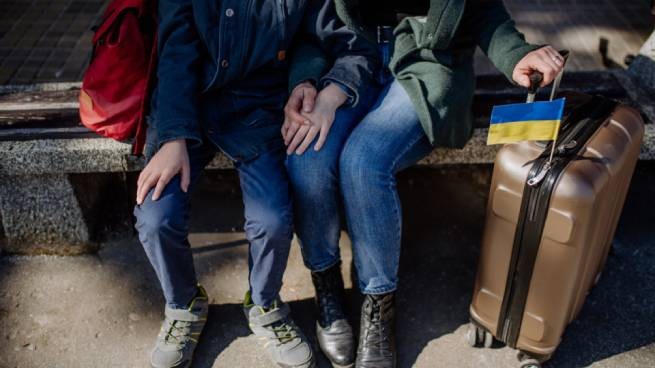Tsalka is a region located in the southeast of Georgia, at a distance of approximately 83 km from Tbilisi.
Since ancient times, it was inhabited by Georgian tribes, but it was completely deserted by the end of the 18th century, due to the frequent invasions of Turks, Persians and other tribes. Tsalka is called “Georgian Siberia” because of the cold climate, and the word tsalka (წალკა) in Georgian means a remote place.
Tsalka district today (source: google.com)
The Pontic Greeks moved to Tsalka after the Russian-Turkish war of 1828-1829, which began on June 14, 1828 with the invasion of the Russian army into the Ottoman Empire and the capture of the cities of Gumushhane, Erzurum, Bayburt, Kars. The war ended very soon with the Adrianople Peace Treaty (1829), which provided for the retreat of Russian troops from the cities they had captured. It was then that many local Christians of these regions, Greeks and Armenians, followed the retreating Russian army and settled in Tsalka, as well as in some other regions of the Caucasus.
Before their resettlement from the Ottoman Empire, the Pontians who lived in the vilayet of Erzurum and its cities – Bayburt and Kars, spoke Turkish, or, more precisely, one of the Anatolian dialects of the Turkish language. Turkophony was imposed on the Christian population in several regions of Asia Minor and the Balkan Peninsula, in an attempt to gradually assimilate and Turkification, and, as a rule, was accompanied by oppression of religious freedoms. The people have preserved stories about the cutting out of the languages of those who spoke Greek and about the dilemma of choice: the preservation of the language or the Christian faith.
Tsalka Greek families, 1947. (source: personal archive of Lena Karachausheva)
Since the Pontians of Gumushkhani and the Erzerum vilayet met the Russian army as a liberator from the Ottoman yoke and helped it in every possible way, at the end of the war they found themselves in danger of Ottoman retribution. The Greeks presented a petition to General Paskevich-Erivanskomou (1782-1856), and he petitioned for them to the tsarist government, which agreed to settle them in the Caucasus. The resettlement took place gradually, with waves of refugees traveling on foot and being attacked and looted by Kurdish groups. Russian troops tried in every possible way to protect the refugees along the way and were not unsuccessful. In addition to the Kurdish attacks, people were tormented by hunger and epidemics, due to which not everyone managed to reach the new place of justification.
Living conditions in Tsalka were extremely difficult, although the state provided tax breaks to newcomers for the first six years. The land did not bear fruit. The epidemics continued and infant mortality was particularly high. The average life expectancy of the population was about 50 years. Especially in 1836, the highest mortality rate was noted, when 226 out of 776 families died. People constantly asked the authorities to relocate them to other parts of Georgia, where agriculture was more efficient. The state did not allow this, because it was strategically important for it to have Christian settlements, traditionally hostile to the Turkish factor, on the border with the Ottoman Empire, as a bulwark against Turkish expansion.
Church of the Nativity of the Blessed Virgin Mary in Tsalka (source: personal archive of Janis Keleshidis)
The spiritual situation corresponded to everyday problems, since a characteristic feature of the villagers was almost universal illiteracy. There were only three schools, and few of those who could afford to send their children to Russian schools in other neighboring areas.
It is worth noting that until the beginning of the 20th century, a constant influx of refugees following the Russian troops did not stop in Tsalka in the subsequent Russian-Turkish wars. At the same time, since the end of the 19th century, the Pontians of Tsalka, like the entire Caucasus, constantly asked to emigrate to Greece. The first such attempts were made in 1894.
In subsequent years, the First World War (1914-1918) began, during which the Tsalka people joined the Russian army and distinguished themselves in the battles for the capture of Eastern Pontus. The end of the war coincided with the October Revolution (1917), which led to the rise of communism and another retreat of the Russian troops from the lands they had conquered. Two decades later, in 1938, a new phase began for the Greeks of the Soviet Union, the so-called “Greek operation”, which meant repression, executions and deportation. There were several dozen victims in Tsalka, the exact figure is unknown today. Some were accused of anti-communist ideology. Others were sentenced to death by firing squad and confiscation of property for “inciting peasants to resettle in Greece,” as it is written in the protocols. Most of those executed were literate, male, about 30 years old on average. Another category of victims were priests, who refused to take off their robes and become civilians.
Later, World War II broke out. More than 5,000 Tsalka residents, regardless of nationality, were enlisted in the army and 1995 of them received medals for excellence and courage. The exact number of dead and missing is more than 710 people.
Tsalka priest Kotanov A. Yakov, victim of Stalinist repressions, with his wife Kalliopi. (source: Achilles Zafirov, Shoot. NKVD against the Greeks of Georgia, Mavrogenis A.E., Thessaloniki 2018, p. 190)
In the post-war years, living conditions have improved significantly. Since 1950, thanks to the construction of a power plant on the Khrami River, the entire Tsalka region has been electrified. The total population was then 45,600 people. In 1979, according to the official census, the ethnic composition of the total population of 49,340 people was as follows: Greeks – 62.5%, Armenians – 28.4%, Azerbaijanis – 4.5%, Georgians – 3.5%, Russians – 0 , 7. %, others – 0.4%.
The Pontic villages of Tsalka, formed gradually, from 1830 to the second half of the 20th century: Avranlo, Akhalik, Gumbat, Edi-Kilsya, Gunia-Kala, Imera, Karakom, Karyak, Livad, Safar-Kharaba, Bashkov, Bediani, Beshtashen, Neon- Kharaba, Jinis, Olyank, Sanamer, Santa, Shipyak, Tarson, Tyak-Kilsya, Barmaksyz, Chapaevka, Trialeti, Tsintskaro, Khadik, Khando, Khram-hydroelectric power station. Of these, only four spoke the Pontic dialect of the Greek language. Also in the region there were 13 Armenian villages, 5 Azerbaijani and 1 Georgian.
Tsalka Greek, Fyodor Evgenievich Kotanov, hero of World War II (source: Κωνσταντίνος Φωτιάδης, Ολληνισμός της Ρωσίας και της Σοβιετικής Ένωσης [Ιστορία / Πολιτισμός 5], Εκδοτικός Οίκος Αντ. Σταμούλη, Θεσσαλονίκη 2003, p. 129)
In the eighties, the local economy improved thanks to the production and export of potatoes. The main product thanks to which Tsalka is known to this day throughout Georgia. In 1984, due to the increase in population, the village of Barmaksyz was officially declared the city of Tsalka. It was the city with the largest Greek community in the USSR and ranked first in the Georgian SSR for university admission. Since 1987, the “Aristotelian Readings” have been held here – conferences on the topic of ancient Greek philosophy and culture, which was the idea of the Doctor of Philosophy Theocharis Kessidi.
Tsalka, 2014 (source: personal archive of Sima Meziridou)
However, in the 90s, with the collapse of the Soviet Union and the opening of borders, the Greek population left Tsalka. The policy of discrimination against minorities, impoverishment, political instability and the eternal dream of Greece led to the mass migration of Greeks from Georgia, primarily to Greece and secondly to Russia. Today there are several dozen Pontians in Tsalka, mostly elderly people. The Pontians who left Tsalka currently live mainly in Russia, Greece and Cyprus. Nevertheless, they periodically return to their homeland, where they tend to their temples and cemeteries.
Spartakos Tanasidis (doctoral student of the Faculty of History and Ethnology of the Thracian Institute named after Democritus).






More Stories
How teacher Ivan Kanidi, at the cost of his life, saved children at the Beslan school
Thessaloniki: Pontians are tried and deprived of Greek citizenship, they face deportation
How Greeks abroad can vote – step by step